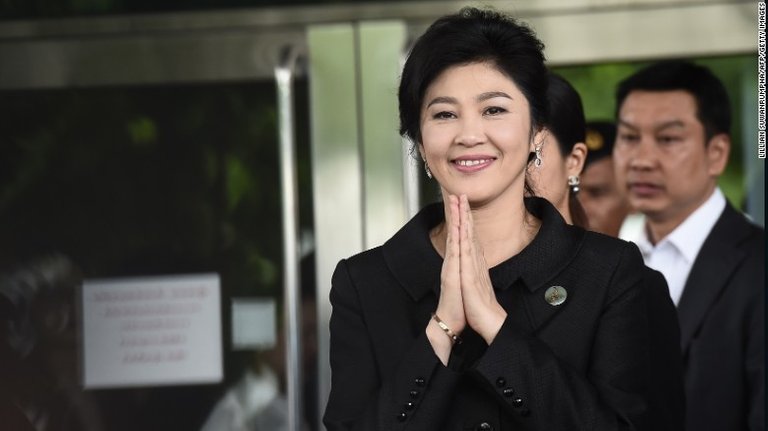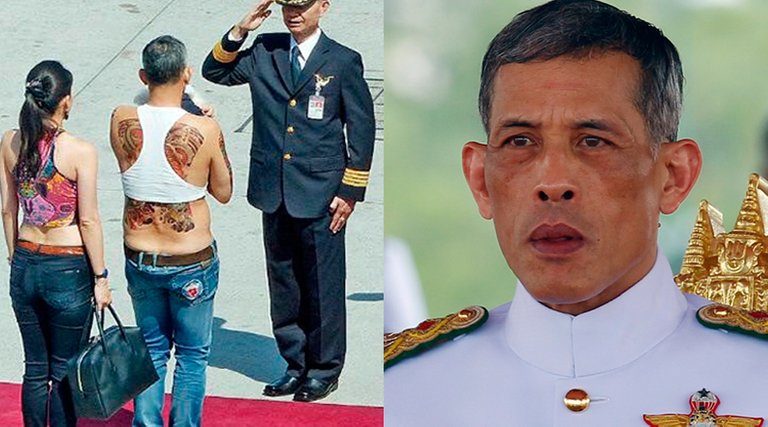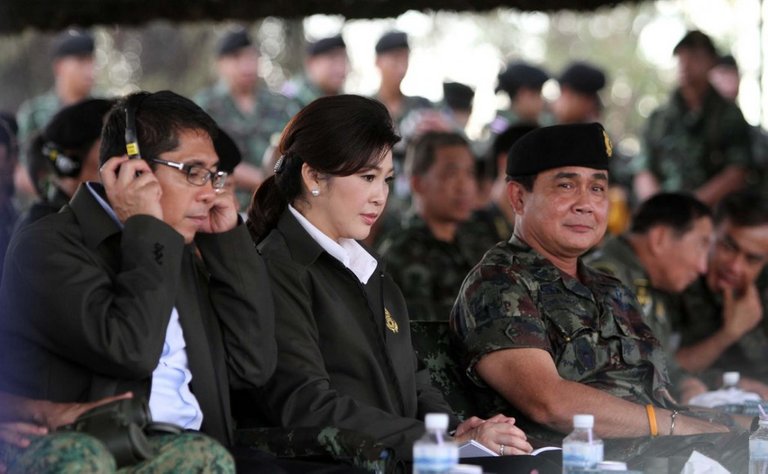English version below.
Nur wenige Länder mussten in den vergangenen Jahrzehnten mehr Umstürze durchstehen, als Thailand. Seit 1932 gelangen dem Militär 12 Putsche und weitere 7 gingen erfloglos aus. Der jüngste Umsturz fand 2014 statt und seither gab es keine Wahlen im Land, obwohl sie für das Jahr 2017 geplant waren. Was ist also passiert?
Der Putsch als Dauererscheinung
Wenn man andere Länder, die historisch gesehen ähnlich stark von Umstürzen geplagt sind wie Thailand, zum Vergleich nimmt, fällt eine Sache auf: sie hatten bei weitem nicht so viele Staatsoberhäupter vom Militär. In Chile, was seit seiner Entstehung 37 Putsche hatte, handelte es sich bei circa 10% der Staatsoberhäupter um Militärs. In Haiti (28 Umstürze) war es ein Sechstel. In Thailand hingegen ist es ein ganzes Drittel. [1] [2] [3]
Der Grund daür ist, dass das thailändische Militär seit der modernen Staatsgründung im Jahr 1932 schon immer eine wichtige Stellung in der Politik hatte. Der moderne Staat Thailand ist sogar durch einen Militärputsch entstanden.
Thailand ist ein regelrechter Nährboden für politische Polarisierung und somit auch für Umstürze, denn die Politik im Land war schon immer sehr mehrdeutig. Besonders in der Zwischen- und Nachkriegszeit, als im Land ein rasantes Wirtschaftswachstum einsetzte, standen sich Konservative Thais (die an der eigenen Kultur festhalten wollten) und die Befürworter der Verwestlichung gegenüber. Man orientiert sich bis heute in vielerlei Hinsicht an ausländischen Einflüssen, gewährt der eigenen Bevölkerung dabei aber nicht dieselben Freiheiten, wie im Westen. Zwischen 1947 und 1958 kam es zu sechs Umstürzen, weswegen viele der Premierminister in dieser Zeit sich bestenfalls fünf Monate lang an der Macht halten konnten. Diese Instabilität führte dazu, dass das Militär mit den Umstürzen aufhörte und dafür fast ununterbrochen circa 30 Jahre lang an der Macht blieb. [3]
Wird es jemals anders sein?
2014 fand in Thailand der letzte Putsch statt und zunächst wirkte es so, als würden die Parteien komplett die Kontrolle über das Land verlieren. Die Premierministerin Yingluck Shinawatra, welche 2014 militärisch des Amtes enthoben wurde, ist die Schwester des bereits 2006 ins Exil gegangenen Thaksin Shinawatra, der ebenfalls durch einen Putsch sein Amt verlor. Ihre Partei, die "Pheu Thai", implementierte eine linksorientierte Politik, die vor allem der ländlichen Bevölkerung und der unteren Einkommensklasse zugute kam. [4]
Genau wie beim Putsch 2006, waren 2014 die zwei großen Kontrahenten die "Roten Hemden" und die "Gelben Hemden". Die erste Gruppe demonstrierte gegen beide Umstürze und möchte, dass der verbannte Thaksin Shinawatra nach Thailand zurückkehrt, während die mittelschichtigen "Gelben Hemden" für die Königsfamilie und das Militär eintreten. [5]
Seit 2014 regiert nun der Offizier Prayut Chanocha. Was eigentlich als eine "Übergangsregierung" fungieren sollte, war keine. Doch der Tod des Königs im Oktober 2016 gab dem Militär die Gelegenheit, etwas zu verändern.

Der Prozess der ehemaligen Premierministerin Yingluck Shinawatra hätte im September 2017 mit einem Urteil enden müssen, aber sie flüchtete nach Dubai, zu ihrem Bruder/The process of former PM Yingluck Shinawatra was supposed to end in September 2017, but she fled to Dubai, where her brother lives
Wahlen 2017 2018?
Bhumibol Adulyadej war von 1946 bis 2016 der König von Thailand. Mit seinem Tod kam sein einziger Sohn an die Macht, der allerdings beim Volk sehr unbeliebt ist, aufgrund seines dekadenten und untraditionellen Lebensstils. [6]
Das Militär gibt allerdings die Vollmacht über fünf Regierungsagenturen und die königliche Schatzkammer (welche einen geschätzten Wert von 6 Mrd Dollar hat) an den Monarchen ab. Vermutlich mit dem Ziel, von ihm ein positives Auftreten beim Volk zu erzielen und ihn für sich zu gewinnen. [7] Die Krönung eines neuen Monarchen hat nun auch die nötige Rechtfertigung für die Verabschiedung einer neuen Verfassung gegeben, die die großen Parteien schwächen soll. [8] Die neue Verfassung diente dem Militär als zusätzlicher Grund, die Wahlen zu verschieben.
Am wichtigsten ist aber, dass das Militär mehrere Bedingungen genannt hat, damit es dem Volk die Macht "zurückgibt". Darunter auch folgende:
1.) Das Militär hat ein Vetorecht bei allen Entscheidungen des Oberhauses des Parlaments bis 2022.
2.) 50% der Parlamentsabgeordneten des Unterhauses müssen dem Militär treu sein und dürfen das Stimmrecht bei der Wahl des neuen Premierministers behalten. [7]
Offiziell seien das alles nur Mittel, um für Stabilität zu sorgen, damit ein friedlicher Machtwechsel geschehen kann. Es wäre aber nicht überraschend, wenn das Militär über das Jahr 2022 hinaus die Oberhand behält.
_________________________________________________________________
There are only a handful of countries that had more coups in the last few decades than Thailand. Since 1932 the military conducted 12 successful coups and attempted another 7. The most recent coup happened in 2014 and since then, there have not been any elections, even though they were announced to take place in 2017. So what exactly happened?
The coup - a chronic phenomenon
If you take other countries with a similar amount of coups for comparison, you will notice a significant distinction: they did not have as many heads of states installed by the military. In Chile, which had 37 coups since it was founded, only about 10% of all leaders were military personnel. In Haiti (with its 28 coups) it's a sixth of all leaders. In Thailand however, a third of its PMs were from the military. [1] [2] [3]
This is because, since the modern state of Thailand was founded in 1932, the military has always been on the forefront of the political arena. Even the establishment of the country occured thanks to a coup.
With its ambiguous politics, Thailand has been a breeding ground for political division (and hence coups) since the very beginning. Especially in the interwar and post-war periods, when the economy started to boom, conservative Thais (dedicated to preserving their own culture) and the advocates of westernization were facing off. Even today, Thai politics align with foreign influences to some extent, while refusing to grant their people the rights they would have in the west. Between 1947 and 1958 there were six coups, which is also why many of the PMs during this period only lasted five months in office at best. This instability led to the military halting their coups and from then on, the military ruled the country almost uninterrupted for the next 30 odd years. [3]
 Der neue König von Thailand ist bekannt für seine Tätowierungen und seine auffällige Kleidung/The new Thai king is known for his tattoos and odd clothes
Der neue König von Thailand ist bekannt für seine Tätowierungen und seine auffällige Kleidung/The new Thai king is known for his tattoos and odd clothes
Will it ever change?
2014 is when the last coup took place, and at first, it looked like the parties were about to fully lose control of the country. Then prime minister Yingluck Shinawatra, who was ousted in 2014, is also the sister of Thaksin Shinawatra, who was exiled by another coup back in 2006. Their party, the "Pheu Thai", implemented several left-leaning policies, which primarily benefited the rural population and the lower class. [4]
Just like the 2006 coup, the 2014 overthrow saw two main movements, the "Red Shirts" and the "Yellow Shirts". The former protested both coups and is advocating for Thaksin Shinawatra to return to Thailand, while the latter mostly represent the middle class, who support the monarchy and the armed forces. [5]
Prayut Chanocha has been the PM for 4 years now. Originally, his cabinet was supposed to be a transition government, but there never came a government to take its place. However, the king's death in 2016 gave the military the perfect chance to act.
 Yingluck Shinawatra und der jetzige Premier Prayut Chanocha (rechts) im Jahr 2012/Yingluck Shinawatra and the current PM Prayut Chanocha (right) in 2012
Yingluck Shinawatra und der jetzige Premier Prayut Chanocha (rechts) im Jahr 2012/Yingluck Shinawatra and the current PM Prayut Chanocha (right) in 2012
Elections in 2017 2018?
King Bhumibol Adulyadej ruled Thailand from 1946 to 2016. Now that he passed away, his only son ascended the throne, but because he leads a very decadent and untraditional lifestyle, he is very unpopular among the Thai people. [6]
However, the military gave him full control over five government agencies as well as the Crown Property Bureau, which is estimated to be worth around 6 billion dollars. The army's goal is probably to get the monarch to support them, but also act in a respectable way. [7] The arrival of the new monarch gave the military the much needed legitimization to amend the new constitution, which will weaken the popular parties. [8]
In addition to that, the postponing of the elections could now be justified.
Most importantly, the military put forward several conditions in order for them to hand power "back to the people". Perhaps the two most interesting conditions are as follows:
1.) The military gets a veto for all decisions of the parliament's upper house until 2022.
2.) 50% of the MPs have to be pro-military and they are allowed to retain their right to vote for the Prime Minister. [7]
Officially, this only serves to stabilize the country, in order to allow a peaceful transition of power. But it would not be surprising, if the military remains the leading force in Thai politics, even after 2022.
Quellen/ sources
Deutsche Quellen: *
Englische Quellen: -
German sources: *
English sources: -
- [1] https://en.wikipedia.org/wiki/List_of_Prime_Ministers_of_Thailand
- [2] https://en.wikipedia.org/wiki/List_of_Presidents_of_Chile
- [3] https://en.wikipedia.org/wiki/List_of_heads_of_state_of_Haiti
- [4] http://www.bbc.com/news/world-asia-pacific-13294268
- [5] https://www.youtube.com/watch?v=JU0SBsR3rIE
Genial, dieses Top, das der da trägt! Spannender Artikel!
Congratulations @adversarius! You have received a personal award!
Click on the badge to view your Board of Honor.
Do not miss the last post from @steemitboard:
Congratulations @adversarius! You received a personal award!
You can view your badges on your Steem Board and compare to others on the Steem Ranking
Do not miss the last post from @steemitboard:
Vote for @Steemitboard as a witness to get one more award and increased upvotes!